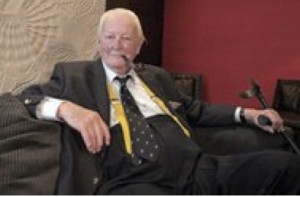 What’s not to like about Tom Sharpe? “Wielding a glittering rapier — or a hatchet, as he preferred to characterize it — he lustily hacked away at a slew of targets, among them racism, colonialism, Thatcherism, academia and the aristocracy”
What’s not to like about Tom Sharpe? “Wielding a glittering rapier — or a hatchet, as he preferred to characterize it — he lustily hacked away at a slew of targets, among them racism, colonialism, Thatcherism, academia and the aristocracy”
He was brought up, mainly in South Africa, by his pastor father as a strong supporter of fascism and Nazism. He spent the bulk of his adult life fighting these forces, using literature and the stage, humour and satire. Here is The New york Times obituary to him, written by Margalit Fox, 8 june 2013.
Tom Sharpe, a British novelist whose work was a riotous dark amalgam of Dickens, Waugh, Wodehouse, Rabelais and Benny Hill, died on Thursday at his home in Llafranc, in the Catalan region of Spain. He was 85 and had lived in Spain, in cheerful dyspepsia, for many years.
A best-selling author in Britain, Mr. Sharpe was considered one of its master social satirists. Though his books have been widely available in the United States since the 1980s, he remains less well known in this country.
Wielding a glittering rapier — or a hatchet, as he preferred to characterize it — he lustily hacked away at a slew of targets, among them racism, colonialism, Thatcherism, academia and the aristocracy.
To that end, Mr. Sharpe crammed his work with excess, particularly excess involving smut, scatology, savagery and grotesquerie. Routine plot elements in his novels might include exploding ostriches, dogs high on LSD, inept spousal murder and all manner of inflatable things.
In its obituary, the British newspaper The Telegraph noted, “As the handgun was a crucial motif to Raymond Chandler, and the billet doux to Barbara Cartland, so whole Sharpe narratives could depend on condoms.”
Mr. Sharpe’s best-known novels include five starring the hapless Henry Wilt. A lecturer at a jerkwater technical college in England, Wilt is condemned to teach classes like Meat One and Gasfitters Two to academically disinclined students.
“The man who said the pen was mightier than the sword ought to have tried reading ‘The Mill on the Floss’ to Motor Mechanics,” Mr. Sharpe’s antihero observes dourly in his first outing, “Wilt,” published in Britain in 1976.
In that novel, Wilt fantasizes about doing away with Eva, his immense, overbearing, sexually voracious wife. But his dress rehearsal for the crime — a curious incident involving an inflatable doll, a construction site and quantities of poured concrete — goes horribly wrong, and though Eva remains gratingly alive, Wilt winds up accused of her murder.
The novel was the basis of the 1990 film “The Misadventures of Mr. Wilt,” starring Griff Rhys Jones as Wilt and Alison Steadman as Eva.
Mr. Sharpe was equally known for his novel “Porterhouse Blue,” published in 1974 and set at the fictional Porterhouse College of Cambridge University.
On this lofty field, a pitched battle between tradition and modernity rages, with blue-blooded stalwarts accustomed to gorging on roast swan in the campus dining hall confronting an onslaught of female students, prophylactics run amok (inflated, they waft en masse onto the college quad) and other terrors.
But the ribald comedy of Mr. Sharpe’s books was merely a counterweight to their essential darkness, which seemed rooted in an English childhood steeped in fascism and a South African young adulthood amid the brutalities of apartheid.
Thomas Ridley Sharpe was born in London on March 30, 1928. His father, a Unitarian minister, was a staunch supporter of fascist causes and a great admirer of Hitler. Young Tom grew up awash in Nazi ideology, and with the outbreak of World War II the family moved often to avoid being interned as enemy sympathizers.
It was only toward war’s end, Mr. Sharpe later said, as he watched newsreels of the liberation of the death camps, that he realized Nazism’s true enormity.
After studying anthropology at Cambridge, Mr. Sharpe moved to South Africa, where he was a social worker in the black townships. His job entailed collecting black tuberculosis patients from hospitals and bringing them home to the townships to die.
“It wasn’t necessary for them to die,” Mr. Sharpe told The Sunday Express, the British newspaper, in 2010. “It was because only white people were being given the drugs.”
He became a photographer to capture what he saw on film and a playwright to set it down on paper. After one of his plays indicting apartheid was produced in Britain in 1960, Mr. Sharpe was thrown into a South African prison.
Deported to Britain the next year, Mr. Sharpe taught at a technical college that would become the model for Wilt’s milieu. His first two novels, “Riotous Assembly” (1971) and “Indecent Exposure” (1973), were scathing, grotesquely comic attacks on South African society.
Mr. Sharpe had a brief early marriage, orchestrated in his telling by his socially ambitious mother, which ended in divorce. “This girl had inherited seven houses,” he told The Telegraph in 2004. “Which was as good a reason for getting rid of her as any.”
His survivors include his second wife, the former Nancy Looper, an American whom he married in 1969; two daughters; and a stepdaughter.
His other novels include “Grantchester Grind” (1995), a sequel to “Porterhouse Blue”; “The Wilt Inheritance” (2010); and “The Midden” (1996).
Though Mr. Sharpe’s books sold millions of copies in Britain, they were not to everyone’s liking. Perhaps the best summary of the divided reception they provoked appears in The Sunday Telegraph’s review of his 1978 novel, “The Throwback,” a sendup of the gentry:
“If getting a taxidermist to stuff your grandfather and blowing up a neighbor’s house by pumping gas up his lavatory pan are your taste in jokes, then Mr. Sharpe is your man,” the review said. “If not, not.”
